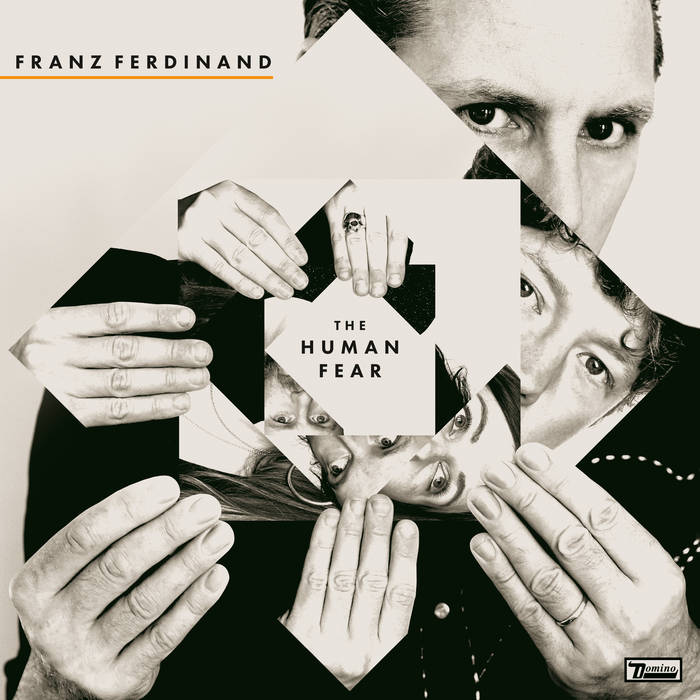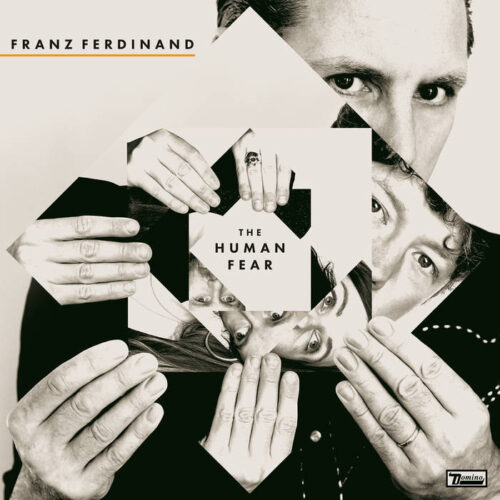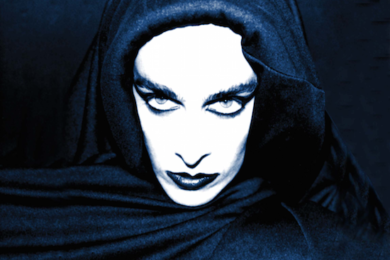It’s been six years since the previous Franz Ferdinand record, Always Ascending, with a hits collection appearing in between. Now comes `The Human Fear, only their sixth album release in a more than twenty year career. Franz Ferdinand is also a significantly different lineup today (though still centred around the voice and lyrics of Alex Kapranos) following the polite slow-motion shuffling off of founder members Nick McCarthy (who left – originally temporarily, then for good – back in 2016) and Paul Thomson (who quit in the post-Covid ‘no gigs’ haze of 2021 and was replaced by Audrey Tait).
It feels strange to think of Franz Ferdinand as a ‘heritage’ band but, post this lineup change, and having left such a lengthy gap between releases – and especially as the cultural landscape has shifted so profoundly around them in recent years – they will clearly have to navigate being perceived in that bracket. The Human Fear could well be part of the process of deciding what to do about that.
The issue with it is, I’m a little surprised to report, this band and their still iconoclastic frontman remain too clever and – to an extent – too fresh sounding, to settle easily into the comfy chair of the ‘heritage’ circuit. I mean, The Human Fear isn’t an especially great, thrilling record, however there are real signs of life here. Playing its best moments, I find myself feeling a lot more positive towards it than last time I made the effort to encounter Franz Ferdinand.
Whether that’s enough, I don’t know. The single releases ahead of The Human Fear did effectively update that ‘classic’ Franz Ferdinand blueprint with contemporary sharpness, without losing their deft quirky touches. I’d say they’ve done this far better this time around than on their last couple of albums, which weren’t half as much fun as this (actually, weren’t much fun at all). This time, they’ve managed to recapture some of the punch of that breakthrough era, presumably via the new members and coming back after some time away.
Opener ‘Audacious’ was an early single. It plays with Strokes-ish driving thinness, before its chorus lurches into a half-speed terrace anthem and a keyboard-led ballad-ish quiet bit. Is it too much? In a certain mood it could be bloody annoying. But actually, kicking off a record of this stuff, they seem to win simply for the track feeling natural about what it’s doing, in bringing the band’s earlier trademark exuberance back into play.
It’s not that they can’t sound ‘now’-ish. In an era when a thousand older alt-rock bands are working their arses off on cringy maximalist over-production, desperately trying to sound up-to-date enough to be rescued by some Tik Tok kids, ‘Hooked’ for example, feels absolutely effortless, enabling its contemporary dry drumbox groove and Sparks-ish twin stompy synth riffs to fit perfectly on an album that otherwise mostly comes off like 2003.
More than any other track here, ’Night Or Day’ leans hard into that original Franz Ferdinand sound and does benefit from it. Of course it all risks pushing them into an obvious trap: the bits that sound most like the old days are the best bits. There is genuine melodic variety and many ambitious arrangement curveballs throughout the record, yet still it’s Franz Ferdinand being unapologetically themselves that is the stickiest and most memorable element in play.
One positive key to that is Franz Ferdinand holding their nerve when they’re sparse. Another is that Kapranos’ arch, thoughtful voyeur of a songwriting voice still pokes through with a neat turn-of-phrase and often holds up. Not always but often, they still have the choruses. So where I started off thinking ‘Everydaydreamer’ was far too twee, once it hits peak, it’s a bona fide bop.
Sometimes the sing-song (almost nursery rhyme) synth play is too much. Early on ‘The Doctor’ has a cloying riff. However, then the song opens up successfully into something evocative and scene-setting. In his droll, observational, never-too-passionate way, Kapranos clearly still has stuff to say, ideas to lean into.
When they veer away from the formula, mostly it doesn’t work (though I like the doomy sense of klezmer, even Weimar-era cabaret, of ‘Black Eyelashes’). But it does feel palpably as if they begin to run out of steam three quarters of the way through. Though The Human Fear is only eleven tracks long, to my ears, the album noticeably dips towards the end. Despite all the studied effortlessness, it ends up a tiny bit lumpen by the close. Despite the excellent angular shifts and overall breadth of sound – which worked for me in the moment, especially earlier on in the tracklisting – it does ends up all sounding a little bit samey.
Really, 2015’s very satisfying Sparks collaboration project FFS gave the game away: if Franz Ferdinand are saddling up for a longer haul, and if they don’t care to sink muddily into backward looking “play the hit!” midsize festival filler, they will need to go much further than this in both challenges: diversifying and recapturing earlier energy. In one sense, they’ve done a whole bunch of interesting projects over the years and deserve a great deal of credit. In another sense, this is a one hit wonder, two decades later, on their sixth album, still trying to chase down that first hit. This is only their sixth album in more than two decades. It’s not bad, sometimes it’s even very good, but it ought to feel much more significant than this.





